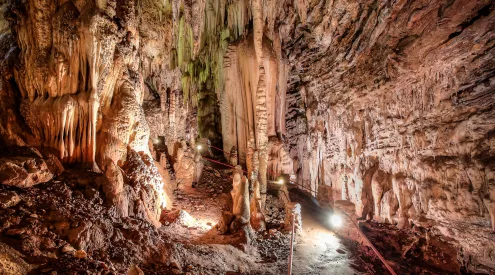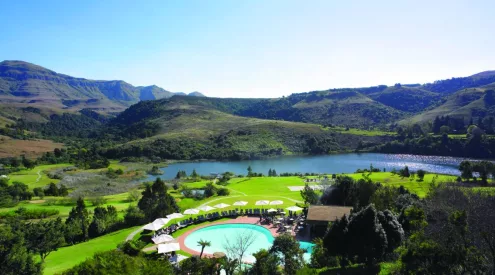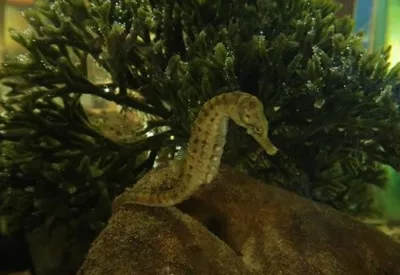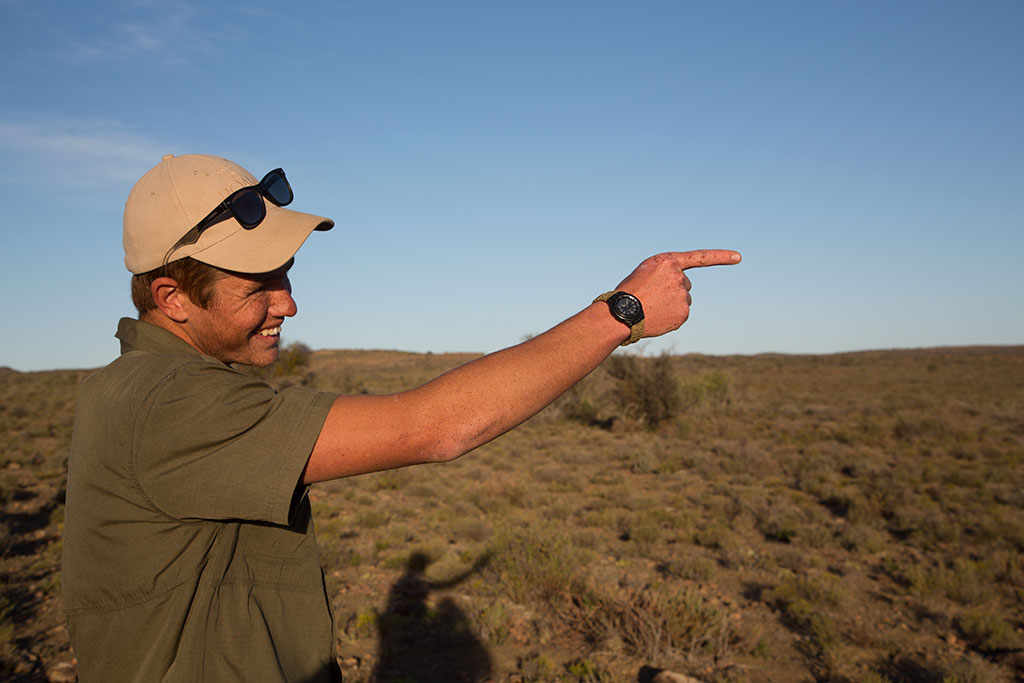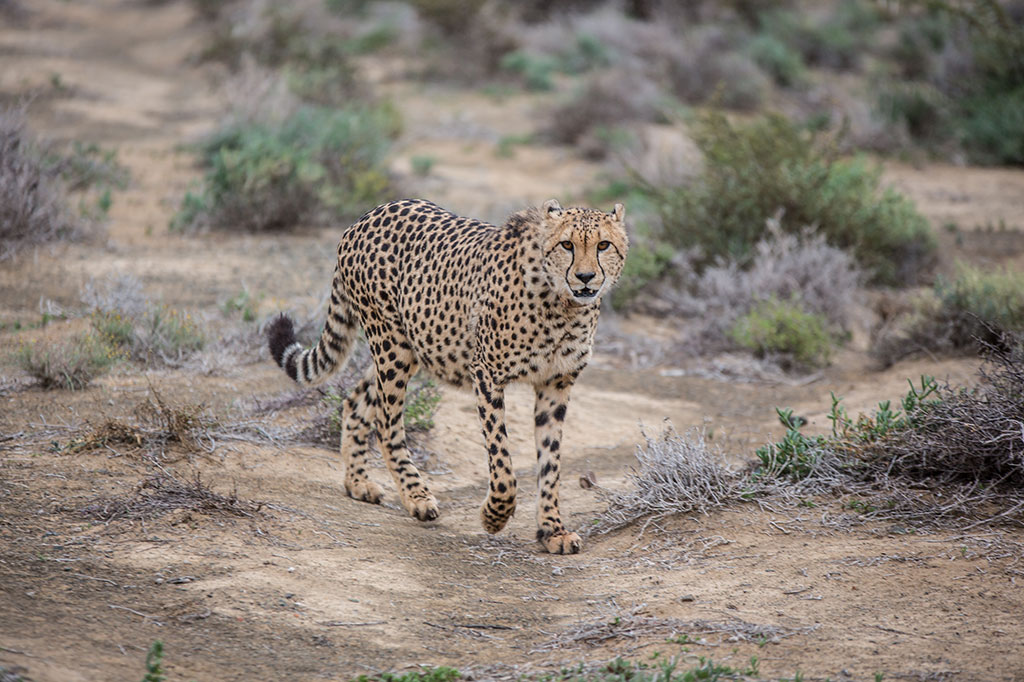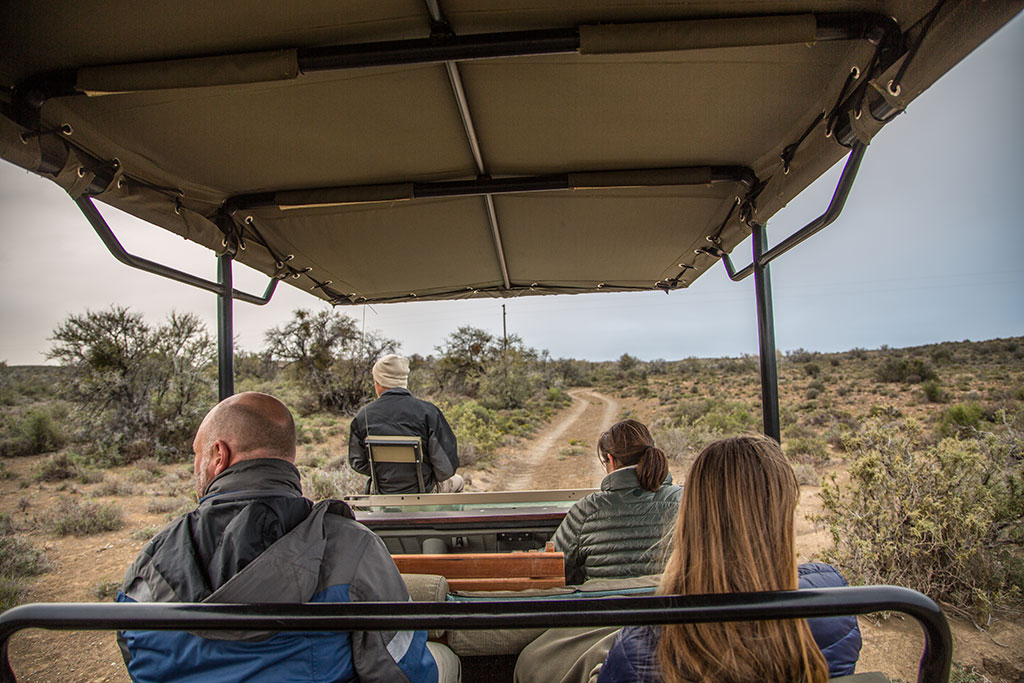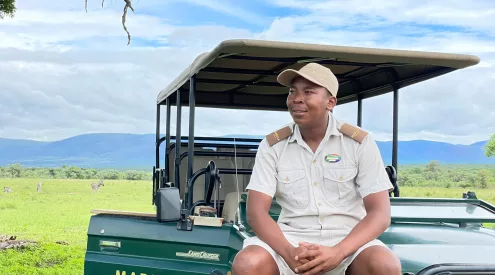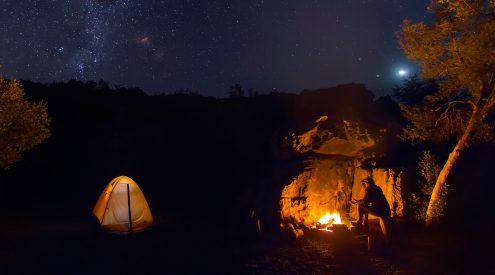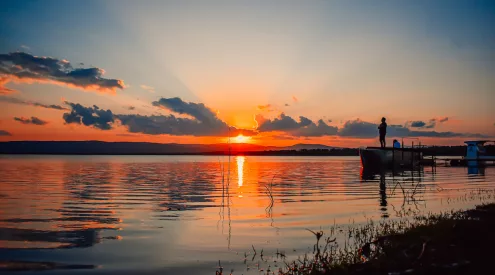In his book, simply titled Karoo, Lawrence G Green describes the land as a ‘vast, silent wilderness.’ I noticed the silence.
On a game drive at Roam Private Game Reserve I heard no rustle of foliage or grass, as the breeze tugged at our hair, no birds twittering in the trees. And yet despite its initial appearance, this land is not desolate.
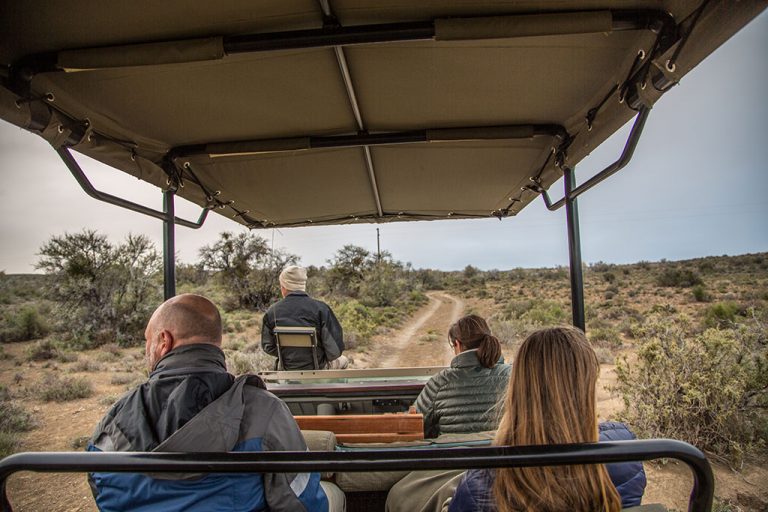
Hot water bottles and blankets helped keep us warm, although it’s still advisable to dress warmly on winter game drives. Image: Elise Kirsten
My family and I spent a winter’s weekend at Roam and on the first morning after coffee and rusks we set out on a drive to explore the 5300 hectare wilderness. Bundled up with hot water bottles and blankets, we settled ourselves in the open game vehicle with Hospitality Manager Abigail de Swart and trainee field ranger Donavin Koen, as our guides.
Roam is situated between Prince Albert and Beaufort West, about 70km from the latter, and this typically historical sheep farm in the Great Karoo was converted to a game hunting farm 16 years ago, before a South African family bought it in 2015 for the purpose of conservation and eco-tourism.
We bumped along the hard-packed earth that’s littered with vaguely rectangular rock and stone and soon we spotted our first game among the grey-green scrub and gnarled bushes. The herd of eland leapt away up the hill as we approached, their large bodies look somewhat equine, except with horns balanced on top of their narrow heads. A few hundred metres later we encountered giraffe that, unlike the antelope, were more obliging to our need to photograph them.

You are bound to see giraffe at Roam, we spotted them frequently. Image: Elise Kirsten
These lovely, long-necked beasts were casually stripping the foliage off the sweet thorn trees, wrapping their muscular, lilac tongues around branches – oblivious to the vicious-looking white spikes meant to protect the bush. Abigail explained how the giraffes’ eyelashes – which could rival those worn by the most theatrical drag queen – brush over the thorns warning the giraffe not to impale their eyeballs.
When we’d had our fill, we continued on towards the temporary cheetah boma. Enclosed in a large area were two brothers who were being habituated to this unfamiliar habitat. The new additions to Roam were days away from being released into the greater game area. “This will be the first time that cheetah roam wild here since this farm became a sheep farm, many, many years ago,” said Abigail.
The last recording of cheetah in this region were five cheetah that were shot in Beaufort West in 1865. Roam has partnered with the Endangered Wildlife Trust via its National Cheetah Metapopulation Project, which works with small reserves to grow the number of wild cheetah in South Africa and manage their genetic integrity. There have been no cheetah on the land that Roam occupies in over 150 years… until these two arrived.
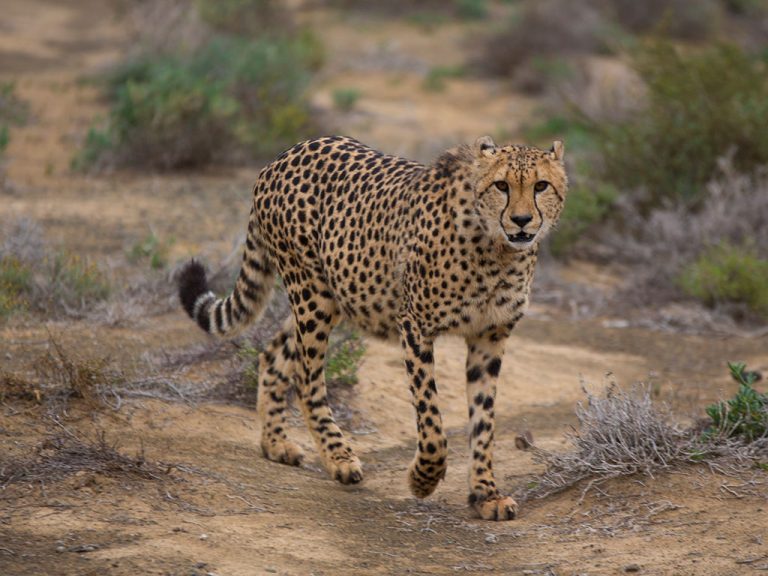
One of the two recently introduced cheetah brothers at Roam. Image: Elise Kirsten
We drove into the boma where we watched the brothers. Intrigued by the visitors I suppose, they got up from where they had been lying, padded into the bushes and then circled around into a clearing where they kept an eye on us, as much as we did on them.
“One of Donavin’s main functions is to monitor the cheetah, taking note of their effect on the animal numbers, their chosen prey species and making sure that they are eating enough and that they aren’t ill or injured,” explained Abigail.
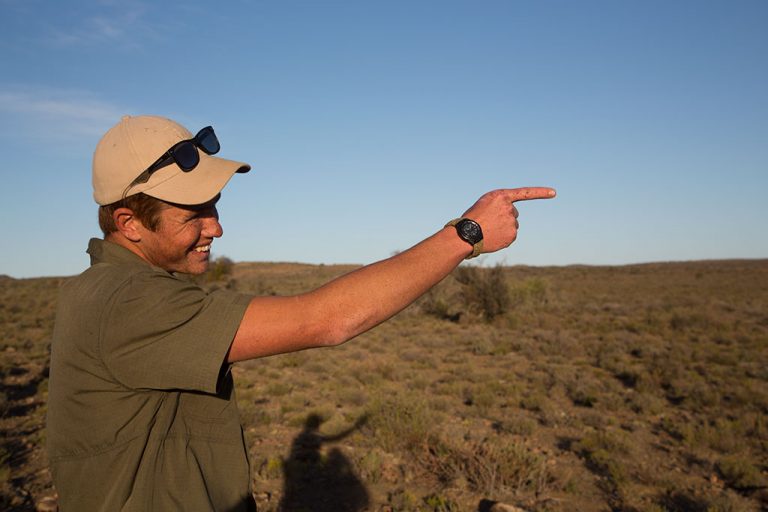
Donavin Koen who guided us on a bush walk was full of funny quips and interesting information. Image: Elise Kirsten
“He is also in charge of locating gangs of meerkat and habituating them to human presence so that guests can enjoy meerkat company with their morning game drive cup of coffee,” says Abigail as she explains the various roles of the staff at Roam.
After we’d had our fill of watching the big cats, the game vehicle made its way up to one of the high points on the reserve were we stopped at a viewpoint ovelooking a gorge. Donavin and Abigail set up a picnic table and out came flasks of hot chocolate, tea, coffee and for those brave enough, on this icy morning, there was a cooler box with soft drinks and beer.
It’s here, while chatting, that we discovered a saddening fact about the zebra at Roam. Not long before we visited there had been a terrific thunderstorm. The herd of nine huddled together, body against body to keep warm in the rain. Unfortunately, a bolt of lightening struck and seven of the nine were killed instantly. We didn’t spot the two striped survivors but, on a happier note, Roam will be acquiring some more local zebra in August.
Before leaving Abigail pointed to a spot overlooking the gorge where she dreams of adding more accommodation, with views down over the ravine. Speaking of accommodation, Roam’s current offering is quite delightful and you can read more about it in the upcoming September issue of Getaway magazine.

The view from Roam Manor House over a section of the Reserve. Image: Em Gatland
Once we had finished our libations, we continued on the morning’s journey and Abigail drove us down to a dry riverbed, of which there are a quite a number in these parts. Here we caught glimpses of kudu – of all the antelope these were the most skittish. Abigail explained that this is because when the area was a hunting farm, the kudu were the game most targeted. Hopefully, with time these magnificent creatures will become more accustomed to being ogled and somehow sense that they are no longer destined to become biltong.
Although Roam is not a large game area that is densley populated, there was still much to discover. As we spen time with our knowledgable guides, Abigail and Donavin, they uncovered so much about the plants particularly, that we were unfamiliar with. The also shared many new details about the animals that live in this harsh climate.
Three Karoo korhaans (bustards) took flight as we rumbled by and this was not our only sighting, over the weekend we saw them repeatedly, sometimes pairs, sometimes in threes. These birds have become the icon that makes up Roam’s logo.
We returned to the lodge, were we were staying, for a hearty breakfast of scrambled eggs (with more tasty herbs and spices than I can recall) and bacon, a selection of fruit salad, yoghurt and cereals, followed later by an equally delicious butternut soup, salad and home-baked bread for lunch.

We followed Abigail and Donavin on the guided game walk, exploring the wonders of the Karoo in the late afternoon. Image: Elise Kirsten
In the late afternoon we set out once again, this time on foot with Abigail and Donavin as our guides. We hunted unsuccessfully for the herd of 15 buffalo that tend to frequent that area, the dry foliage crunching underfoot. We saw more korhaan, investigated many of the plant species, such as the common spike thorn, kapokbos, sweet-thorn Acacia and the wild pomegranate.
When we returned to the lodge a young, male kudu was drinking from the waterhole below the swimming pool and while we watched him drink, we were treated to home-baked chocolate cake, paired in my case with my favourite, green tea.
Our final foray for the day, was a short drive across another dry riverbed to Roam’s Explorer Tented Camp and then we made our way on foot to a small rise to watch the sun slip over the horizon. Before it did, it provided an atmosphere so exquisitely serene, as the last of the warming rays glowed off the surface of the rocky landscape. My soul drank in the beauty of the Karoo sunset and the wide open space that seems to stretch into eternity.
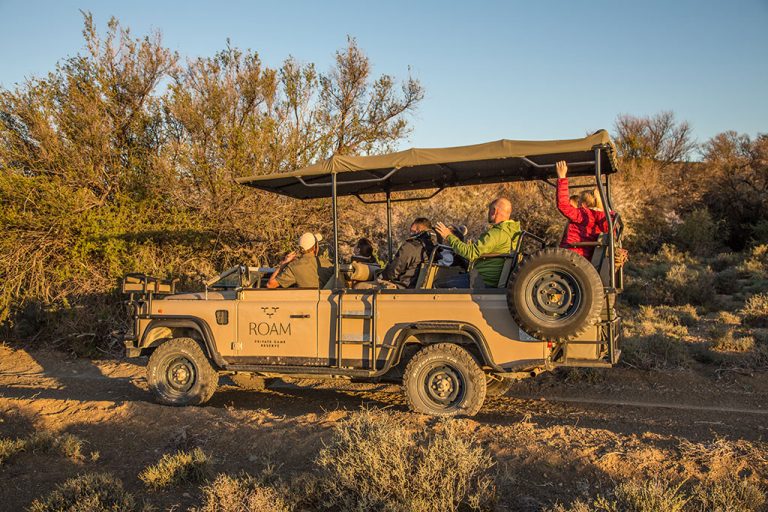
We stopped here, near the Tented Camp and walked up a small rise to enjoy the sunset. Image: Elise Kirsten
Back at the tented camp Donavin had made a fire. As the sky darkened, it felt as if a host of heavenly caretakers began flicking the myriad light switches needed to illuminate the Milky Way for us to experience. We sipped gluhwein and hot chocolate and spent hours chatting, my one daughter using an app to identify constellations in the impressively, sparkly night sky. The night sky that we see over the suburbs near Cape Town compared to that over Roam can be likened to watching old 1980s TV footage and then juxtaposing that against the latest 3D movie visuals accompanied by Dolby surround sound.
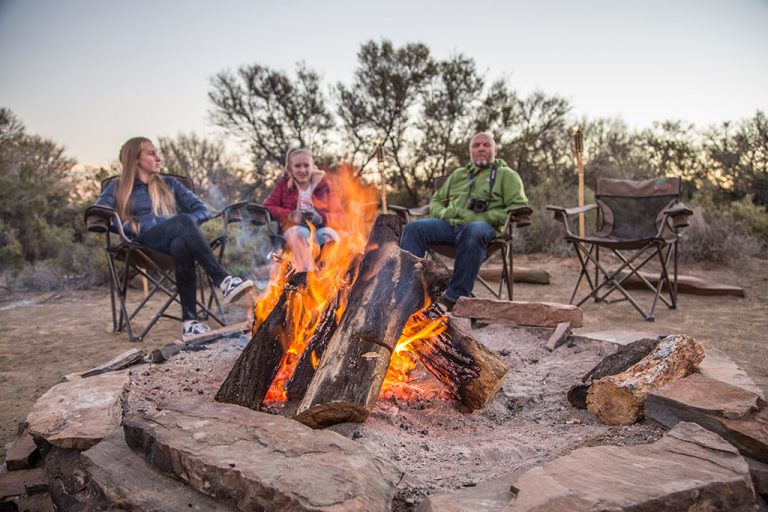
Sitting around the fire at Roam’s Tented Camp, waiting for night to fall and show off the starry heavens. Image: Elise Kirsten
Our enjoyable stay came to an end the following day and as we drove back to Cape Town I reflected on the charm of the Karoo, which is hard to define. It draws you in subtly, wins your affection and then when you’re gone, you’re left longing to return.




